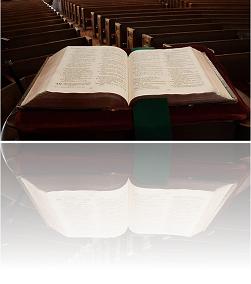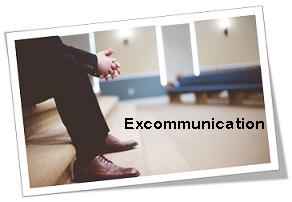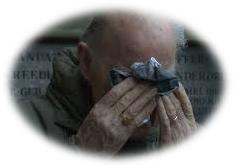The Confession of Faith Article 32 Of the Order and Discipline of the Church
The Confession of Faith Article 32 Of the Order and Discipline of the Church
In this article we read about the discipline of the church. Our fathers have seen this subject to be of such great importance that an entire article is given to it. The same subject is spoken of in Lord's Day 31 of the Heidelberg Catechism and in Articles 77 and 78 of the Church Order of Dordt. It is not surprising that our fathers have considered discipline to be of the greatest importance, for God is a God of order, and therefore it is indispensable for the church. His wrath is against disorder. When His commandments are not kept, we come into disorder, just as we find in Psalm 89:30-32, "If his children forsake My law, and walk not in My judgments; if they break My statues, and keep not My commandments; then will I visit their transgressions with the rod, and their iniquity with stripes."
 The Lord cannot tolerate a forsaking of His law, and He will punish it. This was very well understood by our fathers, and therefore they emphasized church discipline. In doing so they acted according to God's Word. In considering this article, two things are discussed: first, the profit of a good order in the church, as commanded by Christ; and second, the purpose of this order and how it should be practiced.
The Lord cannot tolerate a forsaking of His law, and He will punish it. This was very well understood by our fathers, and therefore they emphasized church discipline. In doing so they acted according to God's Word. In considering this article, two things are discussed: first, the profit of a good order in the church, as commanded by Christ; and second, the purpose of this order and how it should be practiced.
In the previous article it was explained that the Lord has given authority to the offices in the church. The office-bearers are called to maintain order, just as it is explained by our fathers, "In the meantime we believe, though it is useful and beneficial, that those, who are rulers of the Church, institute and establish certain ordinances among themselves for maintaining the body of the Church." In the same manner Paul wrote to the congregation of Corinth, "Let all things be done decently and in order," (1 Corinthians 14:40). The Lord gave leaders to His church, and they have the responsibility for good order. The apostle Paul wrote Timothy and Titus how this should take place, and also in other parts of the Bible it can clearly be found that discipline must be maintained. Such decisions may not be made by individuals, but by consistories, classis, or synods.
The Lord has given authority to the local church. These local churches, having communion with other churches in a certain region, form a classis. A number of classis together should form a particular synod, as it is called in Holland. (Because of the great distances, this is impossible in this continent.) All the particular synods form the synod. In Canada and the United States there is this difference that all the classis form the synod. The unity between the churches does not end with this. If there are churches which have the same confession but are situated in other countries, then unity is maintained by correspondence.
Nevertheless, the center of authority lies in the local church. All higher assemblies may have their boards, which have authority during the meetings, but at the end of the meeting these are dissolved. The consistories continue to have authority. Do these higher assemblies then have no real authority according to God's Word? They certainly do. We can find this in Acts 15, which speaks about the first synod of the New Testament church. There the apostles and elders are called together to discuss several matters related with the life of faith in order to maintain the body of the church. In speaking of the body of the church, we should remember that Christ is the Head and the body is formed by the members. Rule is entrusted to Christ, Who is King, Lawgiver and Judge. The royal jurisdiction of Christ is described and we may not forget that which Christ, the only Master, has ordered or instituted. "Yet they ought studiously to take care, that they do not depart from those things which Christ, our only Master, hath instituted."
The catechism and church order speak of it in the same way. There it is confessed that Christ Himself executes the authority and discipline in the church. The discipline is of Divine origin. If we had more impression of this, then the use and misuse of discipline would be much less. We should remember that discipline is a medicine and not a means of revenge. It is medical and not judicial!
How can discipline be exercised in the right way? Only when we act according to the Word and command of Christ, and are led by His Spirit. This was understood by our fathers, as they tried to cleanse the church from the leaven of Rome. Rome laid burdens upon men which were nearly unbearable, and the commandments of Christ were nearly forgotten. What a blessing that the Lord remembered His church and has led them out of the house of bondage, which is Rome. The church of the Reformation is a planting of the Lord, and tries with God's help to live according to the institutions of the Lord. In the beginning of the Reformation the church was blessed with a rich spiritual life, even though it was the church under the cross and many had to pay for their true confession with the price of their life. We must say of Rome that it condemns righteousness and justifies wickedness, and this is an abomination to the Lord. The church of the Reformation returned to God's Word and the discipline which He commanded.
Guido de Bres, who died as a martyr, and also our fathers of Dordt have tried to keep discipline pure. In certain places in God's Word we find the word "key" used instead of discipline, signifying the keys of the kingdom of heaven. This expression is also used in Isaiah 22.  The prophet had to announce that Shebna would no longer be the scribe for David, and that his place would be taken by Eliakim. Of this Eliakim, the Lord says to Shebna: "And the key of the house of David will I lay upon his shoulder; so he shall open, and none shall shut; and he shall shut, and none shall open." The work of Eliakim was to decide who was allowed to enter into the palace of David, or who was to be excluded. As a sign of his office that person carried a key upon his shoulders.
The prophet had to announce that Shebna would no longer be the scribe for David, and that his place would be taken by Eliakim. Of this Eliakim, the Lord says to Shebna: "And the key of the house of David will I lay upon his shoulder; so he shall open, and none shall shut; and he shall shut, and none shall open." The work of Eliakim was to decide who was allowed to enter into the palace of David, or who was to be excluded. As a sign of his office that person carried a key upon his shoulders.
Christ has also given authority to the church to use the keys of the kingdom of heaven. The Lord willing, we hope to write a little more about this next month. You may now already feel that God, as a God of order, wants to have order in His church. When we forsake His institutions, the Lord will come against us. His displeasure rests upon the sinner. How necessary is the guidance of the Holy Spirit for all of us.
The authority given to the church is different than the authority of the government. The government receives the sword, but the church uses the keys of the kingdom of heaven. The sword is a symbol of force by which to rule, while the key is more the symbol of serving, a moral authority. The government receives the authority to punish the trespasser, while the censure of the church is more as a medicine to heal.
Censure is not only in respect of our daily life, but it is also in respect of doctrine. Not only an unchristian conduct is condemned, but also an unchristian doctrine. We may neither give room to the lie in the church, nor to the wickedness in our daily life. Although we must be faithful in censure, it should always be done in the spirit of meekness. It should be such a wonder that we are not living in the same sin, and it is only due to the restraining hand of the Lord. For example, if you visit a person in prison, you should not look down upon that person, but realize that if the Lord had left us a moment unto ourselves, we would also be behind the bars. Censure is to be used out of love for the Lord and out of love for our neighbor, and never out of revenge. This is the way that censure must be administered.
To maintain unity in the church according to God's Word, both in conduct and in doctrine, our fathers decided that every office-bearer must sign the forms of unity and promise to subject themselves to God's Word and these three forms of unity. We know that these forms are human institutions and stand under the authority of God's Word, but we may not deny that they are according to God's Word and give a good insight into the Truth. The forms of unity have a binding power for the church only if it can be proved that they are according to God's Word; if the opposite can be proved, they would then lose their authority. However, if we make a careful study of them, we will find out that they are according to the Scriptures. No office-bearer is allowed to make changes in these forms by himself; it may only be done by a General Synod. But we do not find errors and contradictions in these forms contrary to God's Word.
Our article does state, "And therefore, we reject all human inventions, and all laws which man would introduce into the worship of God, thereby to bind and compel the conscience in any manner whatever." Human inventions and laws may not rule the church, because it is God's house and the body of Christ. We have only to take notice of the church of Rome, which is full of human institutions contrary to God's Word or the spirit thereof. Calvin was very much opposed to them, and thought that every law in the church made by man without the backing of God's Word and used to instruct the people in how to serve the Lord should be rejected. Calvin was not an advocate of many laws and provisions. Those rules stimulate only to sin, because our sinful nature is drawn to the forbidden and thus the outcome can be the opposite of that originally proposed. Only that which is not according to God's Word can be censured.
 The weak or the sinners should be warned with patience, love and meekness. That is the reason why our fathers have also applied the censure in steps. Censure already begins with the ecclesiastical admonition by the consistory, which goes together with a temporary denial of taking part in the Lord's Supper, as it is the calling of the consistory to keep the Lord's Table holy. They will also lose the other rights of a full member, as long as this censure is applied. If no attention is paid to these admonitions or silent censure, the three steps will follow, which will also be made known to the congregation. Of silent censure, nobody may know of it except the consistory and the trespasser. Such a censured member does not immediately lose his membership (this can only happen by excommunication or withdrawal), but by this censure he loses the rights of his membership – he may not take part in baptism or in the Lord's Supper, he may not vote, etc. He, of course, may come to church, where he will receive a place just as anyone else, and this can be blessed by the Lord to return him from his ways, but also to his conversion; "the Son of Man came to seek and to save that which is lost."
The weak or the sinners should be warned with patience, love and meekness. That is the reason why our fathers have also applied the censure in steps. Censure already begins with the ecclesiastical admonition by the consistory, which goes together with a temporary denial of taking part in the Lord's Supper, as it is the calling of the consistory to keep the Lord's Table holy. They will also lose the other rights of a full member, as long as this censure is applied. If no attention is paid to these admonitions or silent censure, the three steps will follow, which will also be made known to the congregation. Of silent censure, nobody may know of it except the consistory and the trespasser. Such a censured member does not immediately lose his membership (this can only happen by excommunication or withdrawal), but by this censure he loses the rights of his membership – he may not take part in baptism or in the Lord's Supper, he may not vote, etc. He, of course, may come to church, where he will receive a place just as anyone else, and this can be blessed by the Lord to return him from his ways, but also to his conversion; "the Son of Man came to seek and to save that which is lost."
The three steps of censure take place only if there is no repentance. After admonition, the first step of censure follows, meaning that the sin but not the name of the sinner is announced in the congregation. They are asked to remember him in their prayers. If the sinner hardens himself, it is necessary to ask advice of classis regarding it before the second step of censure is applied. It is possible that they may wish to hear parties, for which purpose a committee is often formed. If they are in agreement with the views of the consistory, permission is then given to proceed to the second step of censure. At that time the sin and also the name of the sinner will be made public in the congregation, and the request is repeated to remember him or her at the Throne of Grace.
We are not better than a person who is placed under censure. If the Lord gives a little discovering light in our life, we become the chief of sinners and need to make confession of guilt before the Lord daily. Have we ever made confession of guilt before the Lord? Or are we still able to maintain ourselves before Him and have never had sorrow about our sins? This is a work of the Lord, but at the same time we must ask Him to give us what we need. When we know our own sins, it will be easier to pray for someone else who has fallen in sin. Many times we are as the Pharisee and think ourselves better than the publican!
The third step of censure is excommunication, which is accompanied by the reading of the form written in the back of our psalter (page 64). Then the bonds with the church are cut off, which is a terrible thing to do and to be done unto us. May the Lord bring the serious warning to our attention under the administration of the Holy Spirit, "Harden not your heart, as in the provocation, and as in the day of temptation in the wilderness."
 Excommunicating from the church. However, it is not final; after repentance and confessing of our sins before God and the congregation, it is possible to return. The form prescribed for this can be found immediately following the form of excommunication in our Psalter (page 65), and is called, "Form of Readmitting Excommunicated Persons".
Excommunicating from the church. However, it is not final; after repentance and confessing of our sins before God and the congregation, it is possible to return. The form prescribed for this can be found immediately following the form of excommunication in our Psalter (page 65), and is called, "Form of Readmitting Excommunicated Persons".
It is a wonder when this may take place in the life of a wayward person. Most of the time when such a person is approached on house visitation and the word censure is used, the request is immediately made, "Send me my papers." It is then forgotten that at the time of confession of faith a promise was made that we would subject ourselves to church discipline should we become delinquent, either by falling or living in sin. Many times our sins are no longer considered to be sin, because we have become so accustomed to the sin which surrounds us. It clearly shows that we have gone with the world very far, and it is to be feared that it will become worse!
In the last days the power of Satan will greatly increase, and this can already be felt throughout the world. And although this article speaks about excommunication, the possibility is also there to return. Of the Lord Himself there is written that He receives sinners, and this is a great comfort for sinners. God's people must often excommunicate themselves, but then it is a great wonder that the Lord returns to them and accepts them again. It is only possible because Christ was rejected during the three hours of darkness on Golgotha for the sin of His church. It was not for the sin which He committed, since He was and remained the Holy One. In His life there was neither hidden nor public sins.
Perhaps the difference between a hidden and a public sin ought to be described. A secret sin is one known only to a few people, and therefore it does not give offence to the church. As an example, two people work together and one of them uses the Name of the Lord in vain. This is a terrible sin, for which in the Old Testament a person had to die. It takes place so often in these days, so that many do not take notice of it and those guilty of it do not realize what they are doing. We must also give an account of these sins before the Lord. The person who heard this curse should not tell others what a sinful man his neighbor is and what he has done. No, then he himself is worthy of censure. He must act according to God's Word in Matthew 18; he should warn him against this sin, and urge him to repent before the Lord, but it all must remain only between them. If there is a refusal to listen to this warning of love, and the person continues in the sin and does not come to repentance, then he himself makes the sin public. Then other persons will be involved and later on also the consistory. In this way a secret sin becomes a public sin. Censure, of course, does not only take place with members, but also with respect to ministers, elders and deacons.
The article of our confession ends – "therefore we admit only of that which tends to nourish and preserve concord, and unity, and to keep all men in obedience to God. For this purpose, excommunication or church discipline is requisite, with the several circumstances belonging to it, according to the Word of God." How censure is to be applied is clearly described in God's Word. In Titus 3:10 we read, "A man that is a heretic after the first and second admonition reject; knowing that he that is such is subverted, and sinneth, being condemned of himself." According to 1 Corinthians 5:2 and 2 Corinthians 2: 5 & 6 excommunication has to be done by the church. It is a cutting off from the kingdom of heaven, but it is conditional; conversion is possible. Calvin writes that the church by excommunication does not bind the person to eternal condemnation, but, unless he returns with confession of guilt for his sinful life, he will be condemned. Smijtegeld says that it is better to die on the stake or scaffold than to be cut off from the church.
The purpose of discipline is: (1) to reconcile the sinner with the church and his neighbor; (2) to take the offence out of the church of Christ, and (3) to sanctify the Name of the Lord. From this you can readily understand that discipline does not involve those outside of the church. Those outside will be judged by the Lord. Neither does it include those who are handicapped in mind and therefore not fully responsible for their actions. However, we may not go in the modern paths of worldly justice, which tries to make people not fully responsible for their actions and thus to escape punishment. This should not be!
Discipline extends over all the members of the church, both rich and poor, governors and subjects, emperors and beggars. Ambrose placed Ceasar Theodosius under church discipline for his misbehavior, and he was not accepted in the church until after he had laid crying at the door of the church and showed true repentance.
Sometimes it is asked whether baptized members may do confession of guilt, and often this is in respect to the seventh commandment. All those who have trespassed against God's commandment and have come to the years of discretion are in duty bound to make confession of guilt. They may not only do this, but it is their duty. I do not deny that the confession of guilt for sinning against the seventh commandment is often only a formality. It seems that in these days it is no more regarded as sin, and is even propagated, but in the eyes of the Lord it remains the same; it is sin! Our bodies should be temples of the Holy Spirit! If we felt more of this, we would not sell ourselves so easily to sinful pleasures.
We are all guilty before the Lord, and every day should make confession of guilt before Him. May the Lord stand up over us as in the days of old, so that many would confess their sin before the Lord, supplicating for mercy. Only in the way of repentance will the favor of the Lord be experienced.

Add new comment